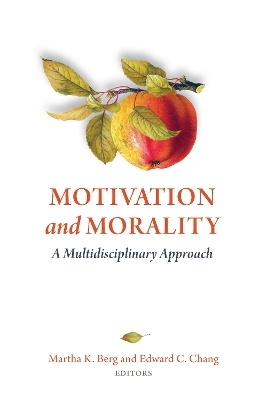
Motivation and Morality
American Psychological Association (Verlag)
978-1-4338-3872-9 (ISBN)
This book offers an integrative examination of the role of motivation in shaping moral cognition, judgment, and behavior.
How do we define good and bad? Where do our moral systems originate? These questions have long sparked inquiry across multiple disciplines, and scholars have debated the answers both within and across academic fields for centuries.
Contributors to this volume cut across disciplines and modes of inquiry to answer key questions about moral motivation. They examine the sociocultural context of morality including norms and norm compliance; psychological frameworks that underlie virtuous behavior and help navigate competing moral obligations; the neurobiology of moral reasoning, and more.
In bringing together leading researchers across sociology, philosophy, psychology, and neuroscience, this book illustrates the complex motivational aspects of morality, which represents a crucial step toward understanding how and why our moral choices arise, and in turn can shape and guide our behavior.
Martha K. Berg, PhD is an industry researcher. She received her B.S. in psychology with distinction and her M.S. in global health from Duke University, and her M.S. and Ph.D. in social psychology from the University of Michigan. Dr. Berg has served as a student representative in the Society for Personality and Social Psychology, and as a student affiliate in the Center for the Science of Moral Understanding. She was selected to receive a Fulbright Research Grant in 2017, and her other awards and honors include the Robert B. Zajonc Scholars Award, the Ruth C. Hamill Graduate Student Research Award, and the Jerome S. Bruner Award for Excellence in Undergraduate Research. Edward C. Chang, PhD is a first generation Korean American, born in Seoul, South Korea. He is Professor of Clinical Science and Social Work, and a Faculty Associate in Asian/Pacific Islander American Studies and in the Center for Positive Organizations, Ross School of Business, University of Michigan. Dr. Chang received his B.A. in psychology and philosophy, graduating summa cum laude, from the State University of New York at Buffalo, and his M.A. and Ph.D. degrees from the State University of New York at Stony Brook. He completed his APA-accredited clinical internship at Bellevue Hospital Center-New York University Medical Center. Dr. Chang served as a program evaluator for the Michigan Department of Community Health – Social Determinants of Health, working with the Asian Center Southeast Michigan. He is serving or has served as an Associate Editor of Cognitive Therapy and Research, the International Journal of Existential Psychology and Psychotherapy, the Asian American Journal of Psychology, and the Journal of Personality and Social Psychology. Dr. Chang has published more than two hundred empirical and scholarly works focusing on optimism and pessimism, perfectionism, loneliness, social problem solving, and cultural influences on behavior. He is the editor of Optimism and Pessimism: Implications for Theory, Research, and Practice (2001) and Self-Criticism and Self-Enhancement: Theory, Research, and Clinical Implications (2007), and is a co-editor of Virtue, Vice, and Personality: The Complexity of Behavior (2003), Social Problem Solving: Theory, Research, and Training (2004), Judgments Over Time: The Interplay of Thoughts, Feelings, and Behaviors (2006), Positive Psychology in Racial and Ethnic Groups: Theory, Research, and Practice (2016), Biopsychosocial Approaches to Understanding Health in South AsianAmericans (2018), Treating Depression, Anxiety, and Stress in Ethnic and Racial Groups: Cognitive Behavioral Approaches (2018), and The International Handbook of Positive Psychology: A Global Perspective on the Science of Human Existence (2022). Dr. Chang was recently identified as one of the 70 “top producers” of scholarly works in clinical psychology, from a pool of 1,927 core clinical faculty from Ph.D. programs across the U.S. His works have received wide media coverage, from The Chronicles of Higher Education to the Wall Street Journal. Dr. Chang has mentored one of the highest numbers of undergraduate students within the department. He has been recognized for his many years of teaching excellence at the University of Michigan by being selected for the LSA Excellence in Education Award in 2008 and by the University Undergraduate Teaching Award in 2011.
Contributors
Preface
Introduction: What Is Moral Motivation, and Why Does It Matter? Martha K. Berg & Edward C. ChangI: Social Contexts and Their Motivational Consequences
Chapter 1. Sociological Perspectives on Moral Motivation Steven Hitlin Chapter 2. What Are Norms and How Is Norm Compliance Regulated? Bertram F. Malle Chapter 3. Cultural Norms in Moral Motivation Joan G. Miller & Jessica L. EngelbrechtII: Psychological Frameworks and Individual Differences
Chapter 4. Consequences, Norms, and General Action Tendencies: Understanding Individual Differences in Moral Dilemma Judgments Bertram Gawronski, Dillon M. Luke & Anita Körner Chapter 5. Motivation to Act Virtuously Nancy E. Snow Chapter 6. Learning to Weigh Competing Moral Motivations Oriel FeldmanHall & Amrita LambaIII: Biological Origins and Markers of Moral Motivation
Chapter 7. The Developmental Neurobiology of Moral Mindsets: Basic Needs and Childhood Experience Mary S. Tarsha & Darcia Narvaez Chapter 8. Morality and Model Coherence: A Constructivist and Biologically Tractable Account of Moral Motivation Jordan E. Theriault Conclusion: Emerging Themes and Avenues for Future Work Kristin Laurin & Irein Ann Thomas
Index
About the Editors
| Erscheinungsdatum | 31.01.2023 |
|---|---|
| Verlagsort | Washington DC |
| Sprache | englisch |
| Maße | 152 x 229 mm |
| Themenwelt | Geisteswissenschaften ► Philosophie ► Ethik |
| Geisteswissenschaften ► Psychologie ► Psychoanalyse / Tiefenpsychologie | |
| Geisteswissenschaften ► Psychologie ► Sozialpsychologie | |
| Geisteswissenschaften ► Psychologie ► Verhaltenstherapie | |
| ISBN-10 | 1-4338-3872-9 / 1433838729 |
| ISBN-13 | 978-1-4338-3872-9 / 9781433838729 |
| Zustand | Neuware |
| Informationen gemäß Produktsicherheitsverordnung (GPSR) | |
| Haben Sie eine Frage zum Produkt? |
aus dem Bereich


